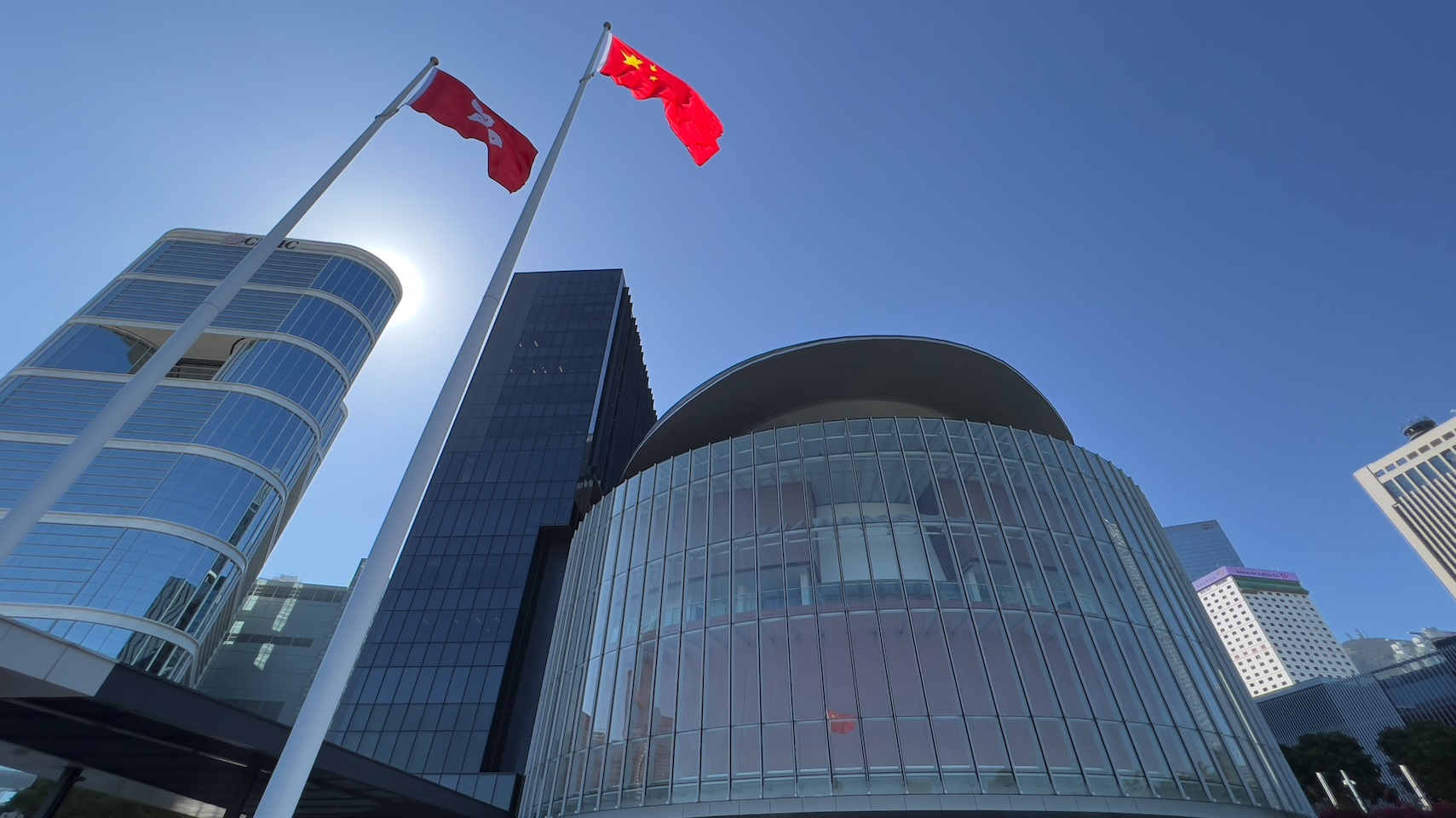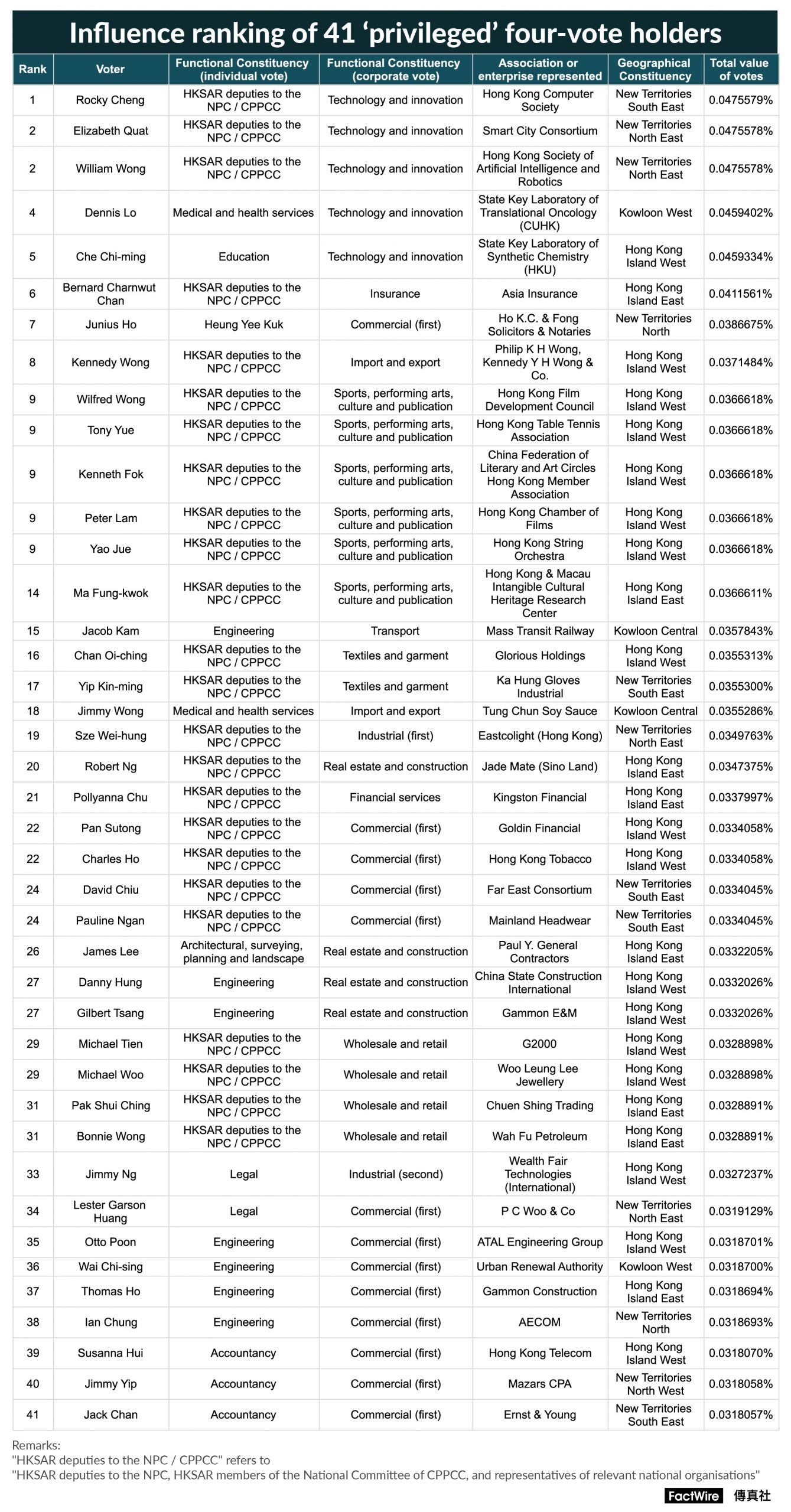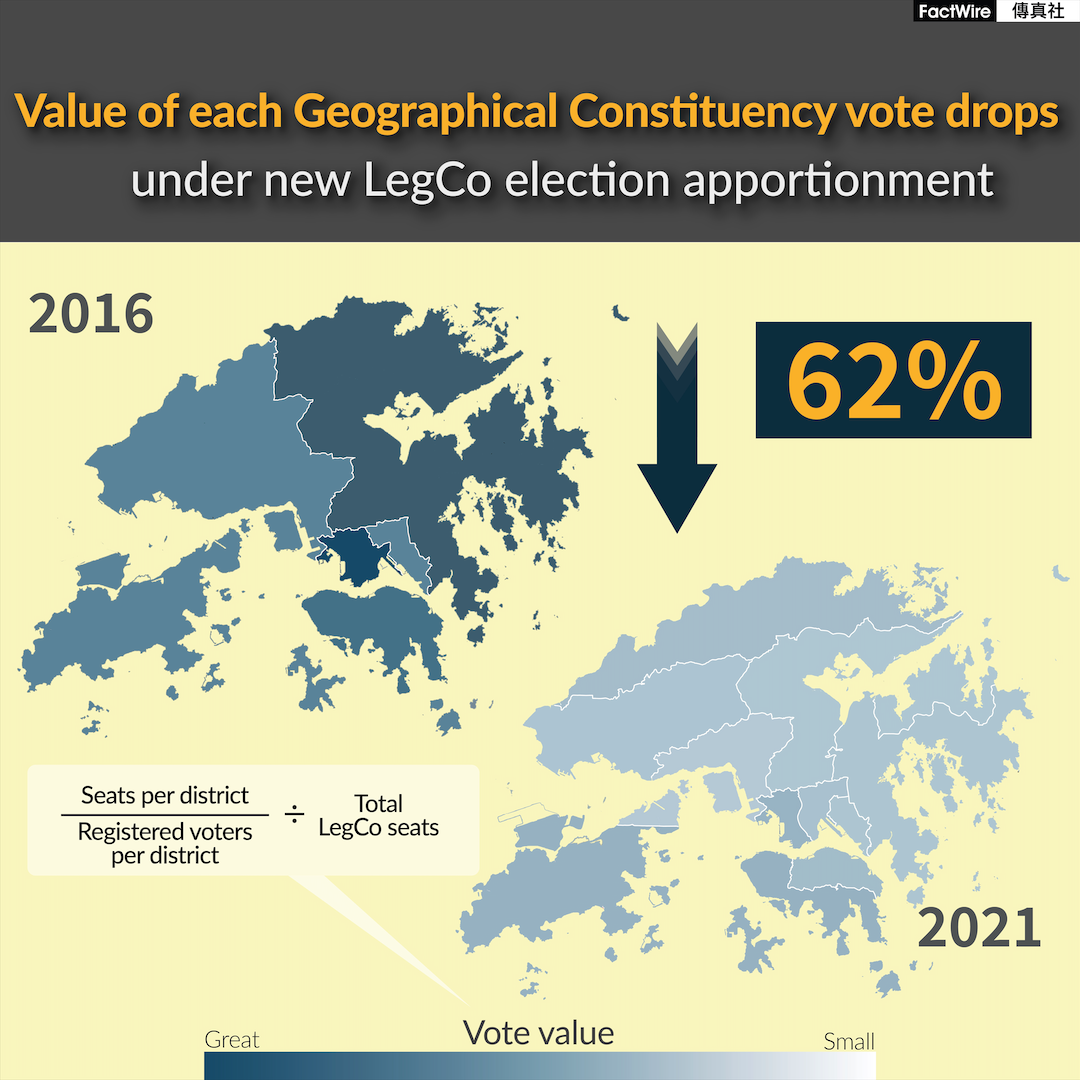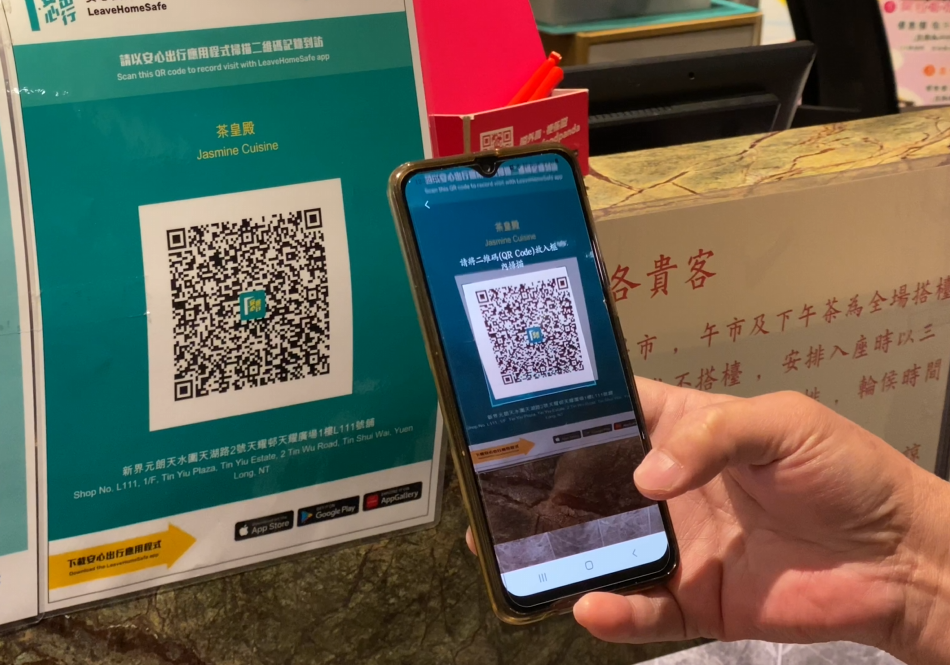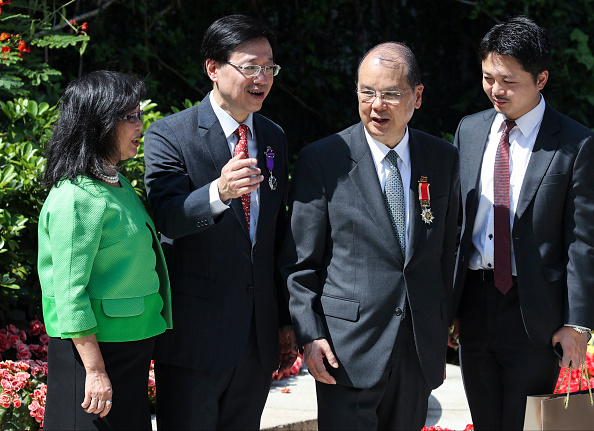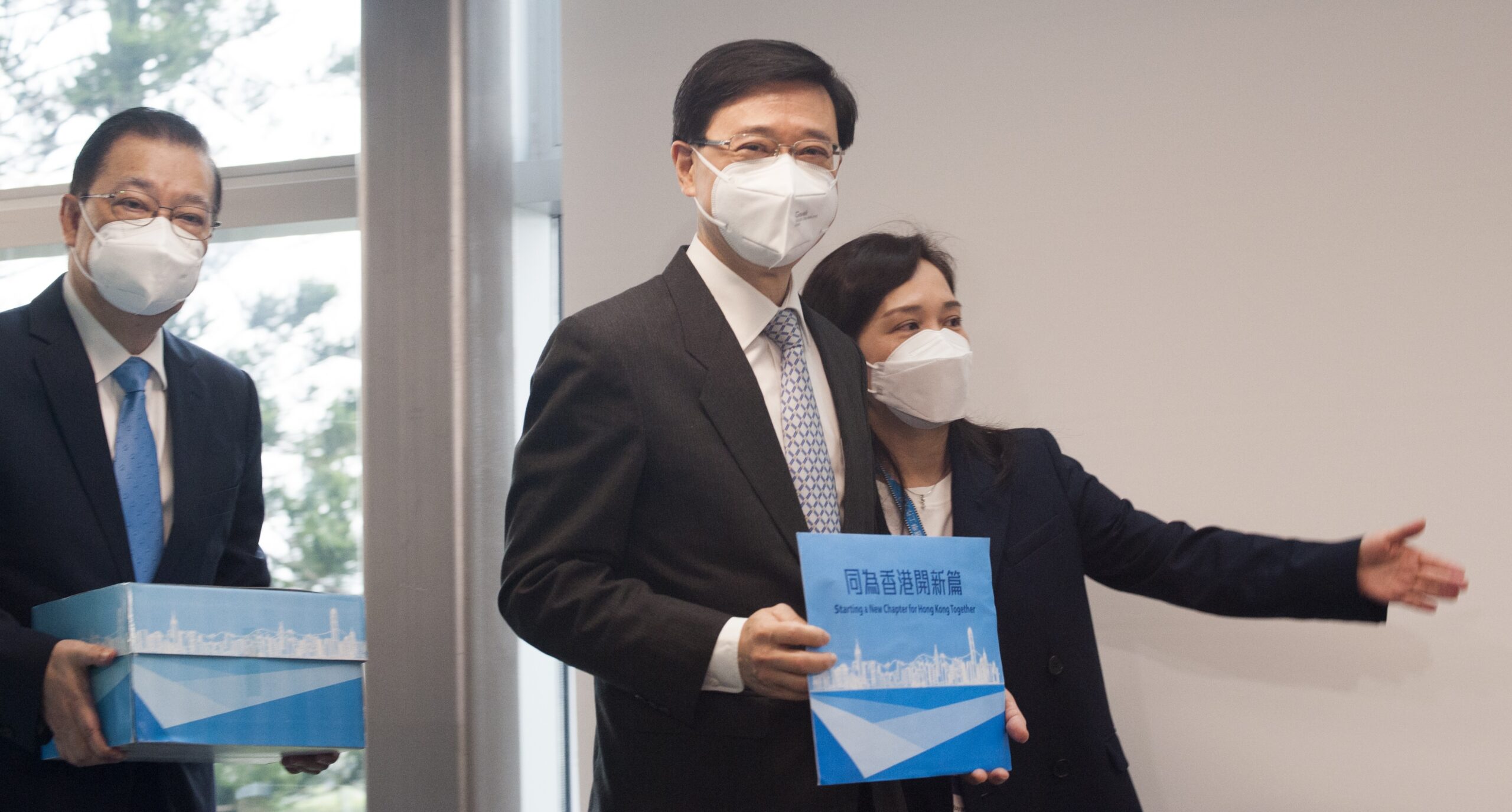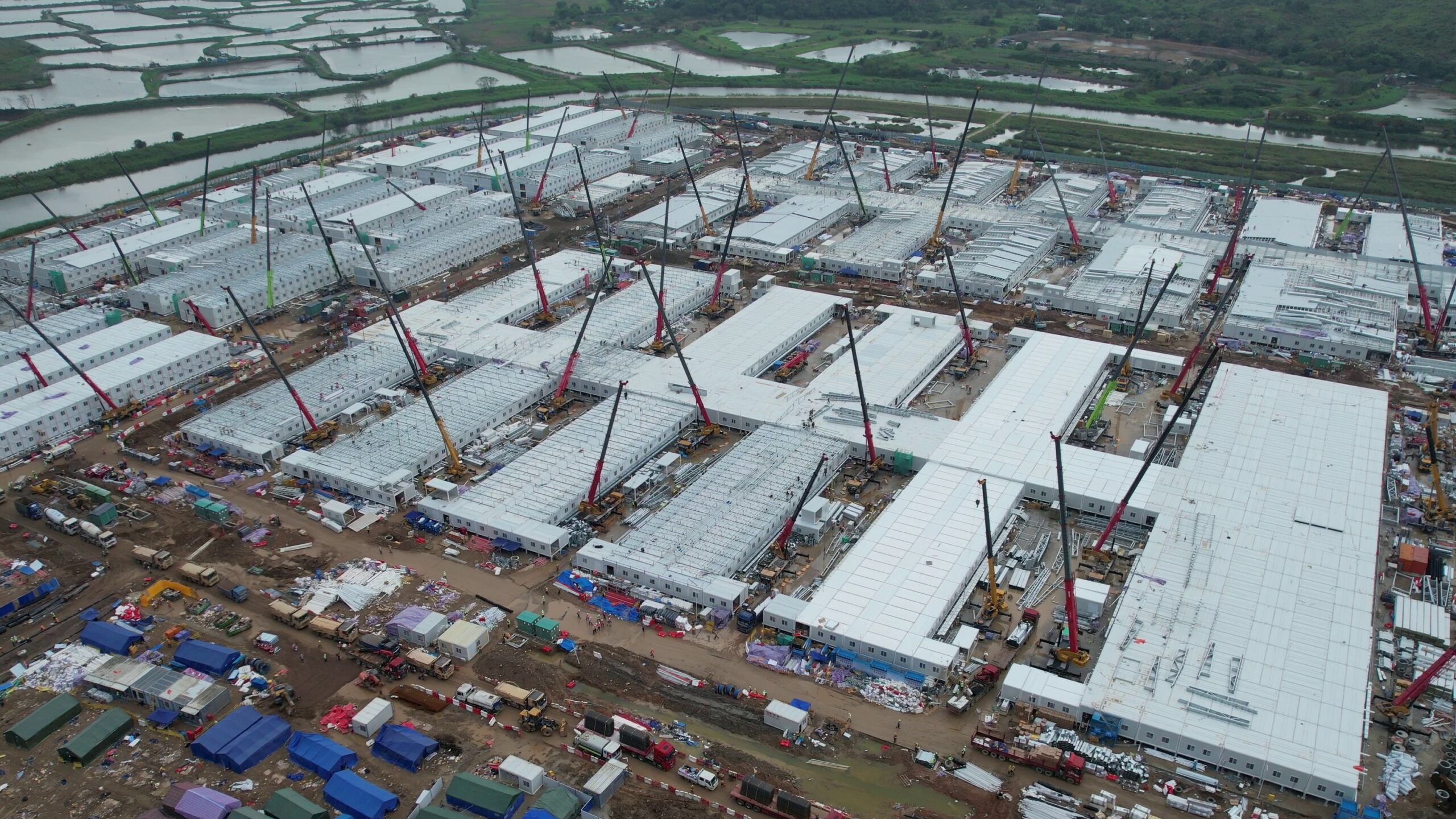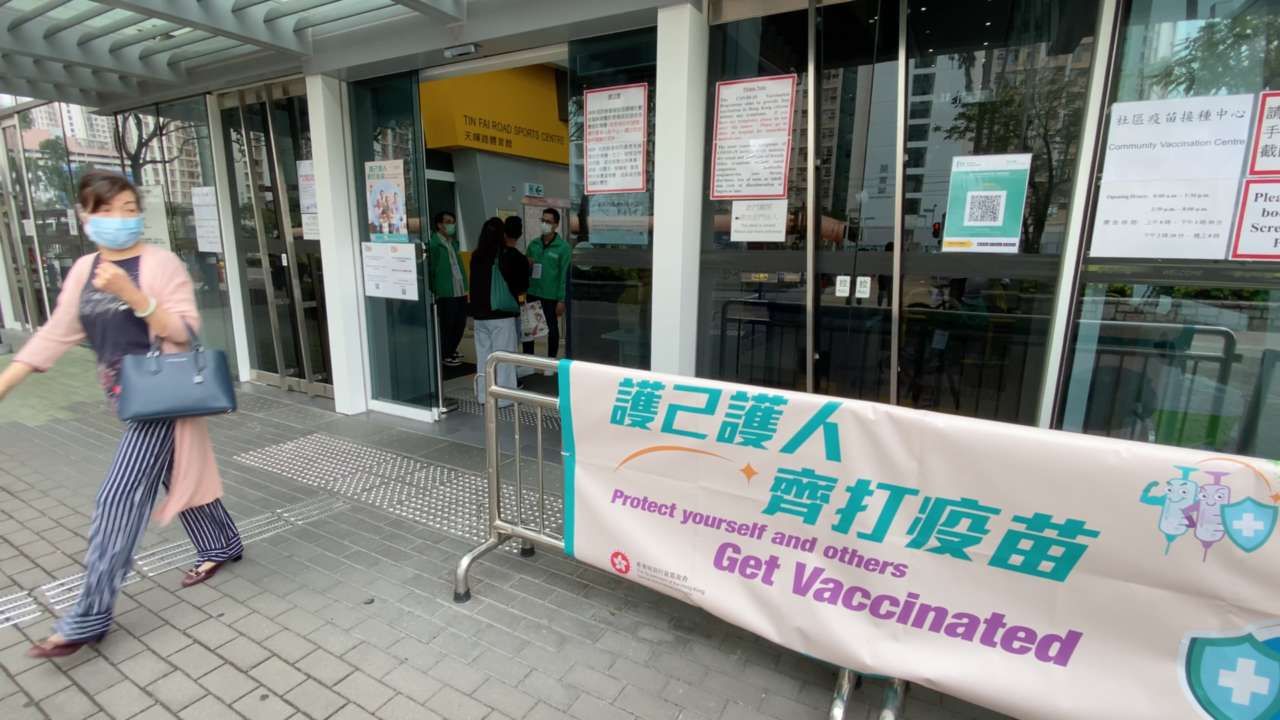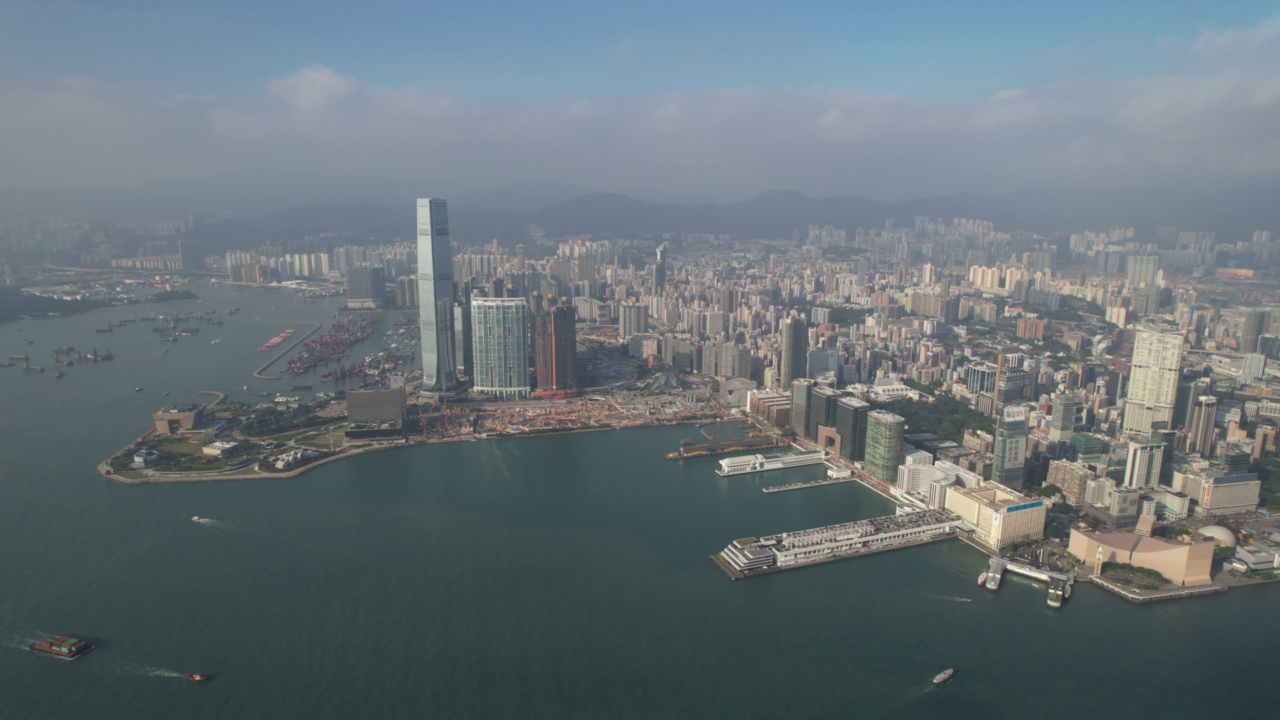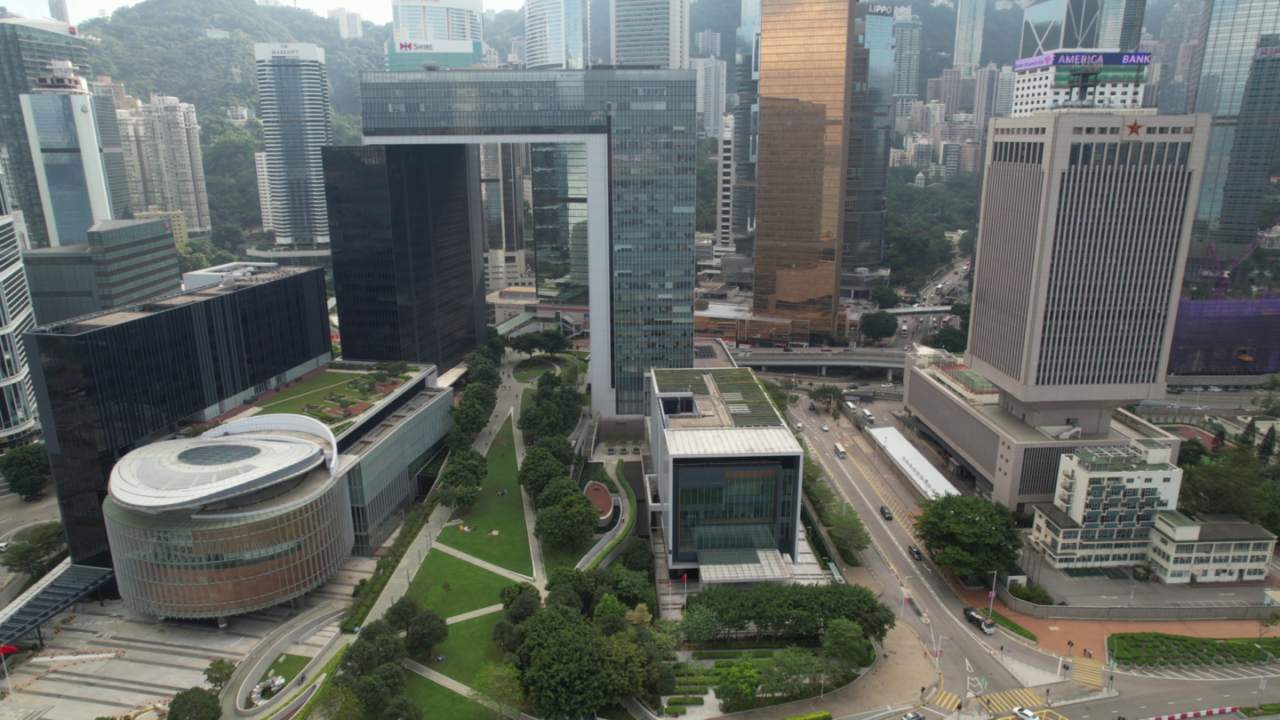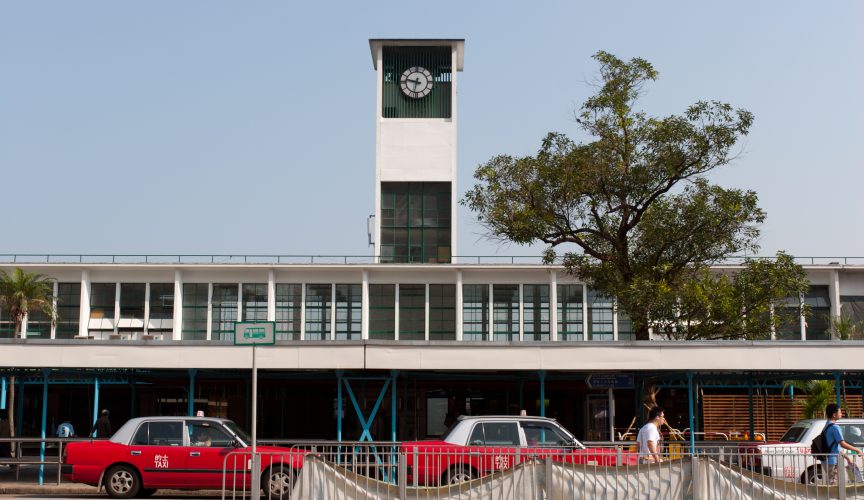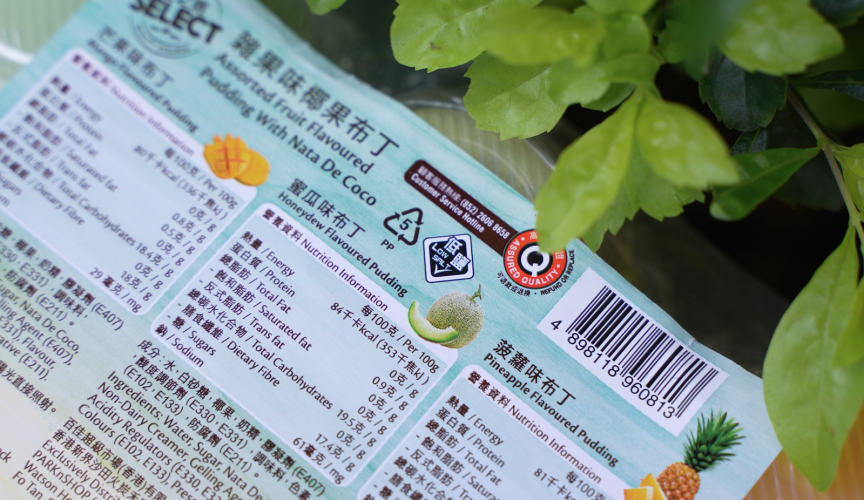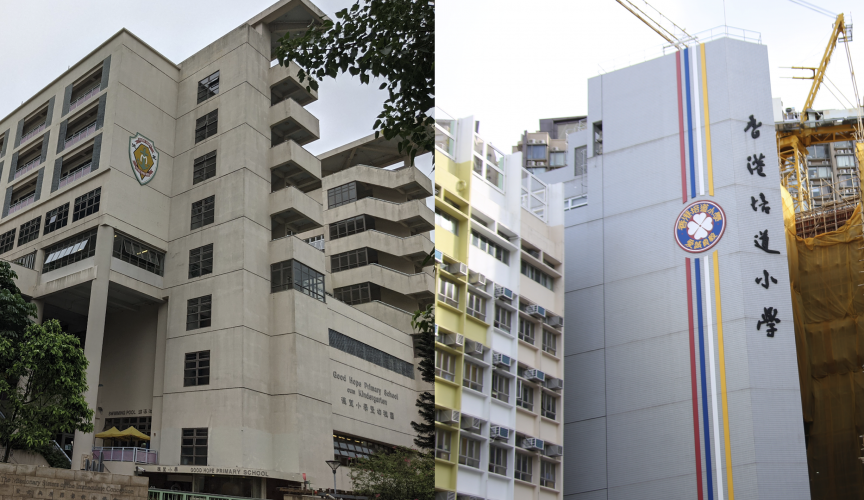At least 41 ‘privileged voters’ will be able to influence 1.47% of LegCo seats in Sunday’s ‘improved’ election, finds a FactWire analysis. The voting power of each of these 41 four-vote holders is comparable to that of 7,215 Geographical Constituency voters who hold one vote each.
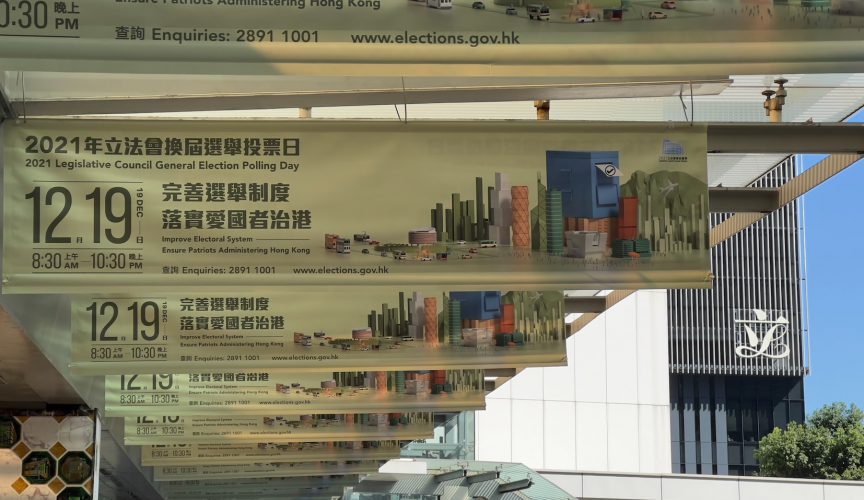
At least 41 ‘privileged voters’ will be able to influence 1.47% of Legislative Council seats in Sunday’s ‘improved’ election, finds a FactWire analysis. The voting power of each of these 41 four-vote holders is comparable to that of 7,215 Geographical Constituency voters who hold one vote each.
The LegCo General Election, scheduled for Sunday, December 19, will be the first one under the ‘improved electoral system’, relevant amendments having been passed in May of this year.
With the addition of the new Election Committee constituency, at least 41 electors will wield four votes while many others only one. Those with the most relative voting power (that is, voting power after adjusting for district or sector size and seats in said district or sector) are Bank of China (Hong Kong) IT manager Rocky Cheng, legislator Elizabeth Quat and university professor William Wong.
Under the Improving Electoral System (Consolidated Amendments) Bill of 2021, the total number of seats in LegCo has been increased from 70 to 90. The numbers of seats in Geographical Constituencies (GC) and Functional Constituencies (FC) have been reduced from 35 to 20 and 30 respectively, while the newly-formed Election Committee Constituency will comprise 40 new seats.
The FC’s composition will also see changes. The District Council sector has been abolished, and three new sectors introduced: namely, ‘Commercial (third)’, ‘Technology and innovation’, and ‘HKSAR deputies to the NPC, HKSAR members of the National Committee of the CPPCC, and representatives of relevant national organisations’. In some sectors, individual electors have been replaced by corporate electors.
The electorate of the Election Committee Constituency comprises 1,500 Chief Executive Election Committee (EC) members, each assigned a ‘block vote’ to select 40 candidates, albeit there are only 1,448 EC members in the current term, owing to vacancies in its LegCo members subsector and the fact that certain members have,ex officio, dual eligibilities.
Under the new electoral system, EC members will be significantly influential as some of them are qualified to vote in the EC Constituency, their own GC districts and two FC sectors (as individual and corporate electors respectively) at the same time, adding up to as many as four votes per person.
By cross-referencing the names, addresses and corporate particulars of the three constituencies’ voters as listed in the final register of electors, FactWire identified 41 people wielding four votes each and more than 650 people holding three.
Among those who have four votes on hand are 24 HKSAR deputies to the NPC, HKSAR members of the National Committee of CPPCC, and representatives of the relevant national organisations. Three of them, Ma Fung-kwok, Elizabeth Quat, and Michael Tien, are also legislators. Other four-vote holders include legislators Junius Ho, Jimmy Ng, as well as an assortment of prominent businesspeople and professionals.
The absolute value of each vote varies, since each constituency has a differently-sized electorate and contains a different number of seats. FactWire determines the influence of four-vote holders by first dividing the number of seats in the relevant district, sector, or constituency by the number of votes therein. Then, this number is divided by the total number of seats in LegCo (90). These values are then tallied to produce a figure that this article refers to as ‘voting power’ or ‘influence’, where appropriate, on the formation of the whole LegCo. The voting power across all votes in Hong Kong adds up to 100%.
FactWire’s calculations show that 1.47% of the 90 LegCo seats will be determined by 41 four-vote holders, each holding an average vote value of 0.0358%. In contrast, the influence of an ordinary citizen who is eligible only for casting a vote in a GC is 0.00000497%. This is a 7,215-fold difference.
The most influential voter is Rocky Cheng, the General Manager of Information Technology of the Bank of China (Hong Kong), followed by legislator Elizabeth Quat, and William Wong, the Associate Dean of the Faculty of Engineering at the Chinese University of Hong Kong. They have a similar voting power of around 0.0476%.
All three of them belong to the same FC sectors, each holding an individual vote in the ‘HKSAR deputies to the NPC, HKSAR members of the National Committee of CPPCC, and representatives of relevant national organisations’ sector and a corporate vote in the ‘Technology and innovation’ sector. These two sectors, along with the EC constituency, are all new in the coming election.
As for GC, Rocky Cheng belongs to the ‘New Territories South East’ district while the other two belong to the ‘New Territories North East’ district. Their voting power values differ by 0.0000001%.
Voters in the ‘Technology and innovation’ sector are the most influential in FC because each seat is determined by only 73 corporate voters. The top five influential voters in FactWire’s analysis all hold a corporate vote in this sector.
Other four-vote holders include the Executive Council’s convenor Bernard Charnwut Chan, legislator Junius Ho, Fok Ying Tung Group’s vice president Kenneth Fok, MTR’s chief executive officer Jacob Kam, Kingston Financial Group’s executive Pollyanna Chu, Sing Tao News’ former chairman Charles Ho, Goldin Real Estate Financial Holdings’ chairman Pan Sutong, Far East Consortium’s chairman David Chiu, legislator Michael Tien, ATAL Engineering’s chairman and husband of Secretary for Justice Teresa Cheng Otto Poon, and Urban Renewal Authority’s deputy chairman Wai Chi-sing. (See details in table)
In addition to wielding four votes each, the 41 EC members also have an influence on candidacy. All candidates running for the election must obtain two to four nominations from each of the five EC sectors – that is, at least ten from the EC at large.
The EC is also the only group who has the right to nominate and elect Hong Kong’s Chief Executive, in the Chief Executive election, scheduled to be held in March of 2022.
All 4,472,863 registered voters in Hong Kong have a GC vote. Under the new system, GC seats have been reduced from 35 to 20, and districts have been rezoned and increased from five to ten. Although the ‘New Territories South West’ district has the greatest number of registered voters at 510,558, only two seats will be returned there, as in all other districts, resulting in a relatively lower influence per vote.
This means, then, that the influence of Rocky Cheng’s four votes, including a GC vote in ‘New Territories South East’, is 10,926 times greater than that of a single-vote elector in ‘New Territories South West’.
Not only does the new electoral apportionment see the voting influence of certain people increased, it also greatly dilutes the influence of GC voters. Dividing the number of GC seats by the total seats in LegCo and by the number of voters, each GC vote had 0.0000132% influence on LegCo’s formation in 2016. This percentage will fall by 62% to 0.00000497% in the upcoming election.
The Improving Electoral System (Consolidated Amendments) Bill 2021 was passed in May this year to revise the composition and method of formation of the next session of LegCo, as well as the electoral systems for the Chief Executive and the EC. The number of EC members was increased from 1,200 to 1,500.
Remarks: Values listed in the article are rounded for ease of reading, and may thus not be exactly equal to the values used in FactWire’s calculations.
Elizabeth Quat, Junius Ho and Ma Fung-kwok are candidates for the Election Committee Constituency. The other 48 candidates for the constituency are:
Allan Zeman, Chan Yuet-ming, Hoey Simon Lee, Nixie Lam, Wong Yuen-shan, Lau Chi-pang, Tan Yueheng, Tseng Chin-i, Wong Chi-him, Doreen Kong, Lee Chun-keung, Leung Mei-fun, Chan Siu-hung, Tang Fei, Chow Man-kong, Ng Kit-chong, Dennis Lam, Rock Chen, Lam Chun-sing, Kenneth Leung, Luk Hon-man, Fung Wai-kwong, Kevin Sun, Judy Chan, Yung Hoi-yan, Carmen Kan, Chan Pui-leung, Nelson Lam, Kingsley Wong, Luk Chung-hung, Choy Wing-keung, Alice Mak, Chan Hoi-yan, Lilian Kwok, Chan Hoi-wing, Cheung Kwok-kwan, Diu Sing-hung, Douglas Koon, Paul Tse, Hong Wen, Tu Hai-ming, Andrew Lam, Sun Dong, Maggie Chan, Michael John Treloar Rowse, So Cheung-wing, Charles Ng, Lai Tung-kwok
In the Functional Constituencies, Kennedy Wong is a candidate for the ‘Import and export’ sector, while the other candidate for the sector is Michael Li. Kenneth Fok is a candidate for the ‘Sports, performing arts, culture and publication’ sector, while the other candidate for the sector is William So. Jimmy Ng is a candidate for the ‘Industrial (second) sector, and the other candidate for the sector is Lo Ching-kong.
Michael Tien is a candidate for the ‘New Territories North West’ geographical constituency. The other two candidates for the district are Holden Chow and Casper Wong.

